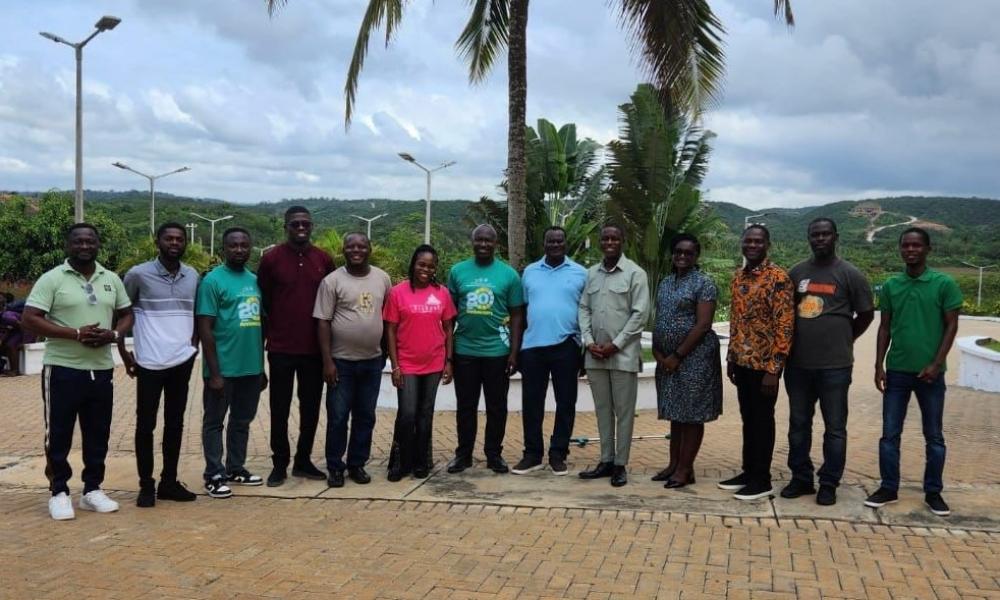Climate Change Threatens Vegetable Growers in Kumasi: KNUST students Call for Urgent Action
The Department of Environmental Science at the Kwame Nkrumah University of Science and Technology (KNUST) has hosted a dissemination forum on the “Perceived Economic Impact of Climate Change on Vegetable Growers in Ghana: A Case Study of the Kumasi Metropolis.”
The program, which brought together farmers, government officials, academics, and youth leaders, underscored the urgent threat climate change poses to agriculture and highlighted both the opportunities and barriers in building climate resilience.
In his address, Dr. Samuel Owusu Ampofo, Director of Agriculture at the Kumasi Metropolitan Assembly (KMA), warned of worsening conditions for farmers in 2024 and 2025, driven by unpredictable rainfall, late rains, and early cessation of the farming season.
“Farmers are forced to replant multiple times and spend more on land preparation. For many poor farmers, this is unsustainable,” he explained. He added that reduced pasture for livestock is compounding the crisis, undermining food security and farmer incomes.
Dr. Ampofo urged climate-smart farming methods, investments in irrigation systems, and better weather prediction models to safeguard Ghana’s agricultural future.
Officials assured participants that recommendations from the research will be integrated into the KMA’s planning agenda and forwarded to policymakers in Accra. Ghana, a signatory to international climate agreements, has rolled out support through subsidies, irrigation projects, and flagship initiatives.
But delays in input distribution remain a critical setback. Fertilizer and seed supplies are often late, partly due to global disruptions such as the Russia–Ukraine war. “Sometimes farmers receive the inputs after the planting season, making them less useful,” one participant noted.
Government representatives highlighted ongoing reforms, including direct procurement, the use of Ghana Card data, and potential digital monitoring tools to improve efficiency and curb leakages across porous borders.
A major concern voiced by farmers was the encroachment of estate development on farmlands in Kumasi. “Even productive vegetable farms are being taken over by estate developers,” one farmer lamented, warning that local food production could soon collapse.
Officials acknowledged the urgency of reserving land exclusively for agriculture. They noted that land ownership by individuals and chiefs complicates preservation efforts but stressed that zoning policies could prevent further losses.
Linda Obiri Yeboah, a collaborator on the study, stressed the importance of ensuring research findings are shared with affected communities. “Data should not just sit in journals. It must inform real policy and practice,” she said. The team has already submitted its findings for peer review.
Youth engagement was also spotlighted. Linda of NPEG Philanthropies introduced a global youth climate initiative spanning eight countries. The program supports young people aged 15–24 with funding and technical guidance to design community-led climate solutions.
The KNUST students -led study surveyed 150 vegetable farmers and analyzed climate data from 1994–2024. Key findings include:
-
80% of farmers reported declining incomes due to unpredictable weather.
-
83% said their livelihoods had worsened, while 75% noted a decline in quality of life.
-
71% observed erratic rainfall, and 82% reported rising temperatures.
-
Farmers are adapting through crop diversification, irrigation, and water conservation, but affordability of technology remains a barrier.
Despite these challenges, Ghana’s agricultural sector recorded a 2.8% growth in 2024, largely driven by improvements in crop production, including vegetables.
The KNUST project underscores that while Ghana’s farmers are innovating and adapting, climate change is inflicting serious economic and social costs. Researchers called for stronger collaboration between government, academia, and communities to safeguard livelihoods and food security.
As one participant concluded: “This research is not just academic—it is a roadmap for protecting farmers who feed our nation.”
